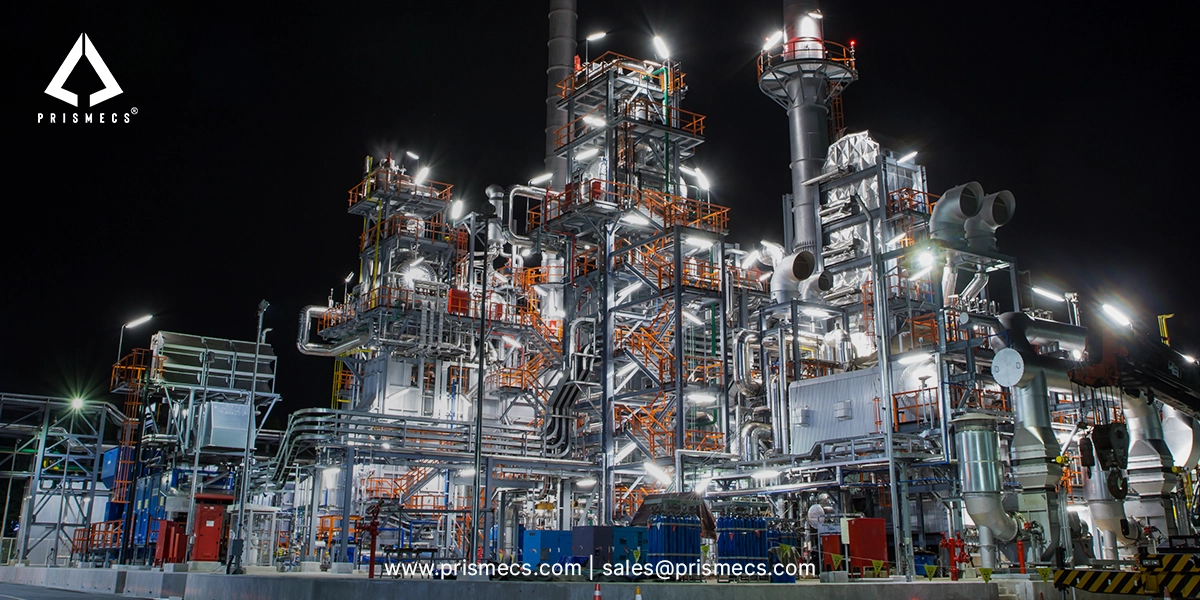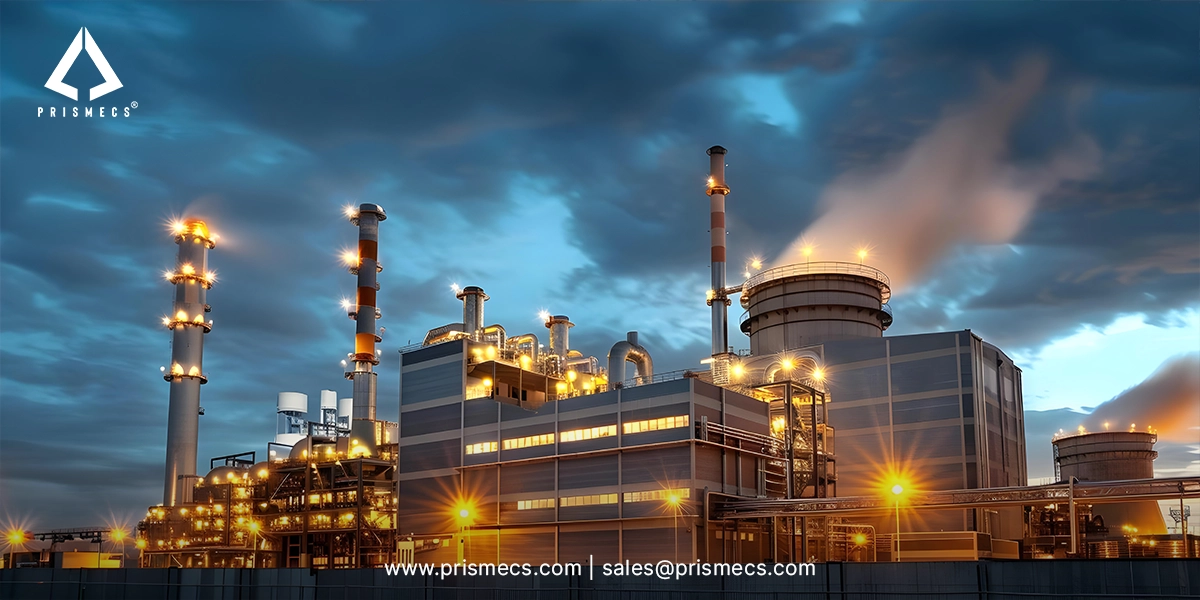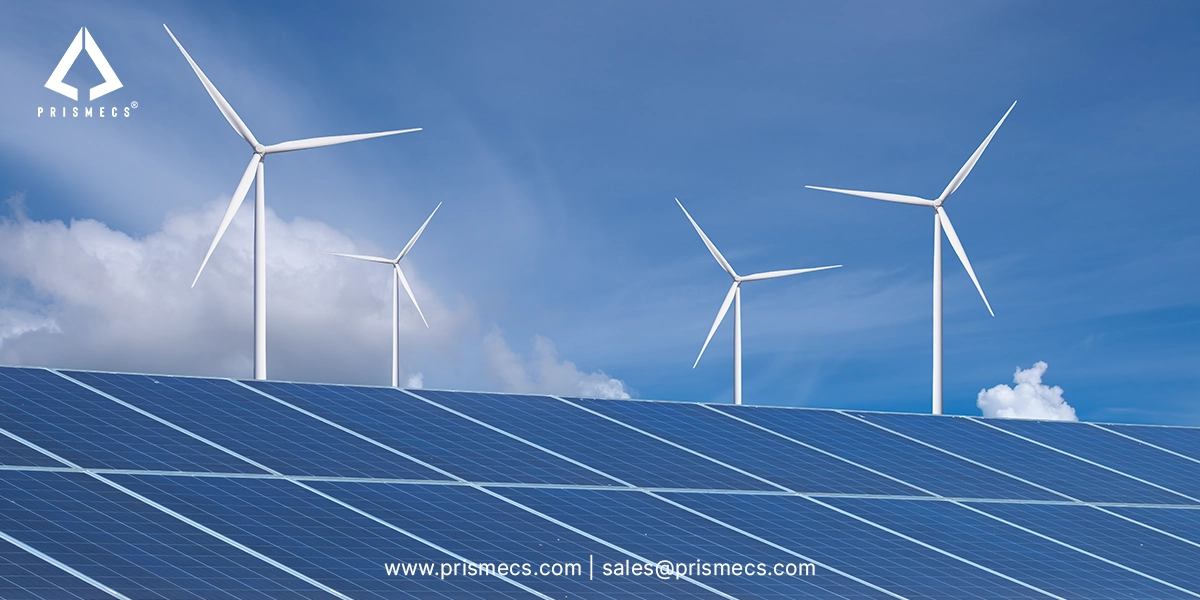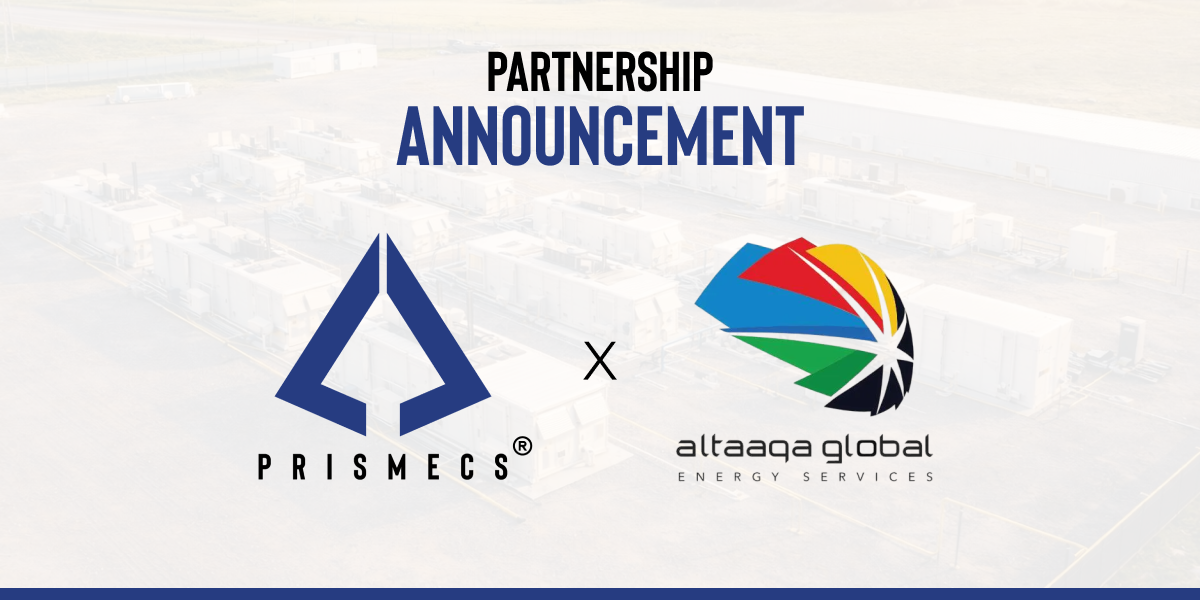
In the modern manufacturing world, petrochemical plants play a vital role. These facilities form the heart of many petrochemical industries. They transform crude oil, natural gas liquids, and other feedstocks into essential petrochemical products. Petrochemicals impact everything from everyday plastic products to industrial chemicals that power various sectors. This blog examines the core operations of a petrochemical plant and its link to oil refineries and chemical plants. It also shows how a petrochemical plant supports diverse applications across the oil and gas industry.
What Is a Petrochemical Plant?
A petrochemical plant is a highly engineered industrial facility designed to process hydrocarbons such as ethane, propane, naphtha, and natural gas liquids into high-value chemical products at scale. These facilities operate through tightly controlled thermal, chemical, and mechanical processes that require advanced equipment integration, instrumentation, and operational expertise.
Most petrochemical plants are located near petroleum refineries or integrated into large petrochemical complexes. This configuration enables efficient feedstock transfer, shared utilities, and optimized production workflows. Successful petrochemical operations depend not only on chemical reactions but also on plant reliability, process automation, and lifecycle asset management to maintain consistent output and safety standards.
How Petrochemical Plants Are Structured
Petrochemical plants are structured into key operational units, starting with feedstock preparation, followed by steam cracking, separation, and conversion processes. Each unit operates in sequence. It transforms raw materials such as ethane, propane, or naphtha into valuable petrochemical products, including ethylene and propylene.
Feedstock Preparation Units
Every petrochemical process starts with the feedstock. Chemical companies select ethane, propane, naphtha, or natural gas liquids, depending on the desired output of the chemical product. These feedstocks come either directly from oil refineries or natural gas processing plants. At this stage, the team separates and purifies the raw hydrocarbons to meet process specifications.
Steam Cracking Units
The core operation of a petrochemical plant lies in steam cracking. This process heats ethane, propane, or naphtha to extremely high temperatures in the presence of steam. This process produces ethylene and propylene. These are the most widely used building blocks in chemical plants and petrochemical facilities.
- Manufacturers use ethylene to produce polyethylene, ethylene oxide, and other derivatives.
- Propylene is essential for creating polypropylene, acrylonitrile, and propylene oxide.
- The steam cracking unit also produces other byproducts such as butadiene, benzene, toluene, and xylene.
Separation and Recovery
After cracking, the mixture contains several gases and hydrocarbons. A fractionation process separates these into different components. They then cool these products and pass them through a series of compressors and separators to isolate specific chemicals. This phase uses complex distillation processes and refrigeration systems. These systems ensure that the right chemicals recover at the correct purity levels.
Conversion and Derivative Units
Some petrochemical plants further process the recovered materials to produce downstream chemical products. For example:
- Ethylene converts into polyethylene or ethylene glycol.
- Propylene transforms into polypropylene or cumene.
- Manufacturers use aromatic compounds, such as benzene and toluene, to produce styrene, phenol, and other solvents.
Companies often integrate these derivative units within the petrochemical complexes to minimize transportation and logistics costs.
Types of Petrochemical Plants
Petrochemical plants are typically classified into olefins, aromatics, and syngas plants based on the kind of products they produce. Olefins plants produce ethylene and propylene. Aromatic plants focus on benzene and toluene. Syngas plants produce chemicals such as ammonia and methanol.
Olefins Plants
These plants focus on producing ethylene and propylene. They use steam crackers to convert ethane and propane from natural gas. They also convert naphtha from crude oil into these valuable monomers.
Aromatics Plants
Aromatic plants produce benzene, toluene, and xylene from naphtha and other refinery streams. These chemicals are vital for making dyes, detergents, and plastic products.
Syngas Plants
These use natural gas or coal to generate synthesis gas (a mix of hydrogen and carbon monoxide). The syngas then helps create industrial chemicals, such as ammonia and methanol.
Significance of Petrochemical Plants in the Oil and Gas Industry
The oil and gas industry continues to produce fuel. Its downstream segment, mainly the petrochemical plant operations, adds tremendous value by converting hydrocarbons into everyday materials. Let's look at why these plants are so essential:
Value Addition to Crude Oil and Gas
Instead of just burning crude oil for energy, petroleum refineries and chemical companies can extract and convert hydrocarbons into profitable chemical products. This increases the economic value of every barrel of oil or cubic meter of gas.
Supporting Diverse Industries
Petrochemical products are foundational to:
- Automotive (plastics, tires)
- Textiles (synthetic fibers)
- Electronics (insulators, polymers)
- Healthcare (medical-grade plastics)
- Agriculture (fertilizers, pesticides)
No modern industrial facility can operate efficiently without input from the petrochemical industries.
Enabling Innovation
From lightweight car components to biodegradable plastics, innovations stem from petrochemical plants. They enable chemical companies to develop new materials that meet the growing demands of consumers and industry.
Safety and Environmental Controls in Petrochemical Facilities
Operating a petrochemical plant requires following strict safety and environmental regulations. The nature of the chemicals and processes involved demands this compliance. Here's how they maintain safe operations:
Advanced Monitoring Systems
Modern facilities rely on sensors and automated control systems to monitor temperature, pressure, and chemical composition in real-time. These systems play a crucial role in controlling high-pressure industrial processes. They support the production of synthetic rubber and specialty chemicals. Continuous data tracking ensures that every manufacturing process stays stable and efficient. It results in a consistent finished product that meets safety and quality standards.
Emergency Shutdown Systems
If equipment failure or abnormal readings occur, automated safety protocols activate emergency shutdowns. These systems protect workers and assets. They are crucial in chemical manufacturing and oil refinery environments. Even minor malfunctions can create severe hazards. By isolating affected units and venting gases safely, these systems prevent damage to the infrastructure. They also maintain stability across the production process.
Emission Controls
To protect the environment, petrochemical plants utilize advanced emission control systems, including flares, scrubbers, and catalytic converters, also known as catalytic filters. These technologies reduce harmful gases released during industrial processes. They control emissions in plastic and specialty chemical production. Many facilities are adopting carbon capture systems to minimize the environmental footprint of carbon atoms released into the atmosphere. Such sustainable efforts contribute significantly to the global economy by promoting cleaner industrial growth.
Wastewater Treatment
Chemical manufacturing and synthetic rubber production utilize water that undergoes multi-stage wastewater treatment before being released into the environment. Treatment plants separate contaminants generated during the manufacturing process, ensuring compliance with environmental standards. This step prevents water pollution and supports the recovery of valuable materials. It makes the production process more resource-efficient and eco-friendly.
Petrochemical Plant vs. Petroleum Refinery
Though closely connected, these two facilities serve different purposes:
Feature | Petrochemical Plant | Petroleum Refinery |
Function | Converts hydrocarbons into chemicals | Converts crude oil into fuels |
Output | Ethylene, propylene, benzene, plastics, etc. | Gasoline, diesel, jet fuel, LPG |
Integration | Often integrated with refineries | Supplies feedstock to chemical plants |
Challenges Facing Petrochemical Industries
Despite their importance, petrochemical plants face several challenges:
Feedstock Volatility
The cost and availability of crude oil and natural gas liquids fluctuate because of geopolitical tensions and market demand. This affects plant profitability.
Environmental Pressure
Increasing scrutiny exists in the carbon footprint of petrochemical facilities. Many countries are pushing for greener alternatives and adopting circular economy models.
Technological Complexity
Managing large-scale operations requires specialized equipment, experienced engineers, and a highly trained workforce.
Competition and Regulation
Global competition, trade policies, and environmental regulations make it harder for new chemical companies to enter the market.
The Future of Petrochemical Plants
The future of petrochemical plants depends on adopting sustainable practices. These practices include using bio-based feedstocks and integrating renewable energy sources. Advances in digital technologies and energy-efficient processes will help reduce emissions and enhance operational efficiency across the industry.
Green Petrochemicals
Innovations in bio-based feedstocks (like plant-derived ethanol) are emerging. These can replace traditional oil and gas industry inputs while reducing emissions.
Energy Efficiency Upgrades
Companies are investing in technologies that reduce energy use in cracking and distillation. Heat recovery systems and digital twins are transforming operational efficiency.
Integration with Renewable Energy
Some chemical plants are experimenting with solar or wind-powered steam generation. This could help reduce reliance on fossil fuels and lower emissions.
Digital Transformation
With AI, machine learning, and predictive analytics, modern petrochemical plants can enhance safety, maintenance, and productivity like never before.
Petrochemical Plants Fuel the Modern World
Petrochemical plants convert ethane and propane into a wide range of plastic products and various chemical products. They act as silent engines driving industrial progress. These industrial facilities connect upstream oil refineries to downstream chemical companies. They power innovations across the oil and gas industry. As the world pivots towards sustainability and efficiency, petrochemical complexes must adapt with greener processes and more innovative technologies. However, their core mission remains the same: transforming raw materials into building blocks of the future.
Partner with Prismecs for Reliable Petrochemical Plant Operations
Effective petrochemical plant operations require more than process knowledge they depend on integrated engineering, reliable equipment, advanced automation, and disciplined maintenance practices. Prismecs supports petrochemical facilities with end-to-end solutions that address design integration, operational efficiency, process automation, and long-term asset reliability.
By combining deep industry experience with modern technologies and a focus on operational excellence, Prismecs helps petrochemical operators improve performance, enhance safety, and adapt to evolving industry demands.
To avail of our services, call us at +1(888) 774-7632 or email us at support@prismecs.com.
Tags: Petrochemical Plant Petroleum Refineries Petrochemical Facilities Petrochemical Products Petrochemical Industries Chemical Product Petrochemical Complexes Oil And Gas Industry Industrial Chemicals
recent posts

Power Generation
10 minutes read
How to Maximize Uptime in Power Generation Plants
Discover how Prismecs power plant maintenance helps operators prevent outages, protect revenue, and keep turbines running at peak performance. Learn h...

Renewables
8 minutes read
Opportunities in Renewable Energy Development
Explore Renewable Energy Development strategies focused on grid stability, faster deployment, and resilient power systems with Prismecs. Plan your nex...

Press Release
2 minutes read
Altaaqa Global & Prismecs Form Strategic Cooperation to Accelerate Modular Power Deployment Across USA
Prismecs and Altaaqa Global Announce Strategic Cooperation to Accelerate Modular Power Deployment in the United States Houston, TX & Dubai, UAE – Febr...

Procurement
9 minutes read
Complete Guide to Industrial Procurement Services
Explore Industrial Procurement Services for power and oil & gas projects. Cut delays, secure critical equipment, and build resilient supply chains wit...